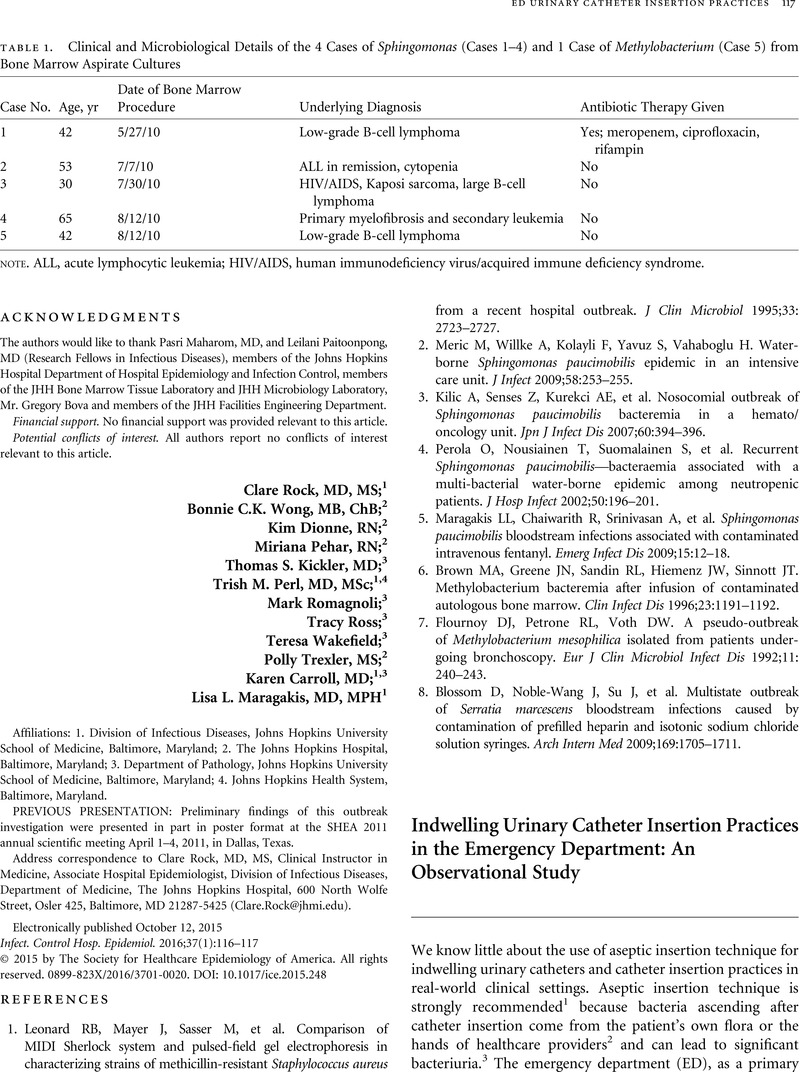Crossref Citations
This article has been cited by the following publications. This list is generated based on data provided by Crossref.
Chenoweth, Carol E.
and
Saint, Sanjay
2016.
Urinary Tract Infections.
Infectious Disease Clinics of North America,
Vol. 30,
Issue. 4,
p.
869.
Carter, Eileen J.
Mancino, Diane
Hessels, Amanda J.
Kelly, Ana M.
and
Larson, Elaine L.
2017.
Reported hours of infection education received positively associated with student nurses' ability to comply with infection prevention practices: Results from a nationwide survey.
Nurse Education Today,
Vol. 53,
Issue. ,
p.
19.
Liang, Stephen Y.
Riethman, Madison
and
Fox, Josephine
2018.
Infection Prevention for the Emergency Department.
Emergency Medicine Clinics of North America,
Vol. 36,
Issue. 4,
p.
873.
Meddings, Jennifer
Manojlovich, Milisa
Fowler, Karen E.
Ameling, Jessica M.
Greene, Linda
Collier, Sue
Bhatt, Jay
and
Saint, Sanjay
2019.
A Tiered Approach for Preventing Catheter-Associated Urinary Tract Infection.
Annals of Internal Medicine,
Vol. 171,
Issue. 7_Supplement,
p.
S30.
Yakusheva, Olga
Costa, Deena K.
Bobay, Kathleen L.
Parada, Jorge P.
Weiss, Marianne E.
and
Kou, Yu Ru
2019.
Variability in catheter-associated asymptomatic bacteriuria rates among individual nurses in intensive care units: An observational cross-sectional study.
PLOS ONE,
Vol. 14,
Issue. 7,
p.
e0218755.
Kulbay, Aysel
and
Tammelin, Ann
2019.
Clean or sterile technique when inserting indwelling urinary catheter: An evaluation of nurses’ and assistant nurses’ interpretations of a guideline at an acute-care hospital in Sweden.
Nordic Journal of Nursing Research,
Vol. 39,
Issue. 2,
p.
92.
Schweiger, A.
Kuster, S.P.
Maag, J.
Züllig, S.
Bertschy, S.
Bortolin, E.
John, G.
Sax, H.
Limacher, A.
Atkinson, A.
Schwappach, D.
and
Marschall, J.
2020.
Impact of an evidence-based intervention on urinary catheter utilization, associated process indicators, and infectious and non-infectious outcomes.
Journal of Hospital Infection,
Vol. 106,
Issue. 2,
p.
364.
Lough, Mary E.
Eller, Susan
and
Mayer, Barbara
2020.
Registered nurses' experiences with urinary catheter insertion: A qualitative focus group study.
Applied Nursing Research,
Vol. 55,
Issue. ,
p.
151293.
Chenoweth, Carol E.
2021.
Urinary Tract Infections.
Infectious Disease Clinics of North America,
Vol. 35,
Issue. 4,
p.
857.
Gagnon, Marie-Pierre
Lambert, Audrey
Roch, Geneviève
Lampron, Amélie
Beauchamp-Chalifour, Élisabeth
Martel, Brigitte
Thibault, Nathalie
Gauvin, Marie-Claude
Lauzier, François
Borgès-DaSilva, Roxane
and
Rhainds, Marc
2021.
Améliorer les pratiques infirmières et la sécurité des patients par l’utilisation optimale des méthodes de soins lors de l’usage des sondes vésicales : protocole de recherche.
Revue Francophone Internationale de Recherche Infirmière,
Vol. 7,
Issue. 1,
p.
100227.
Kulbay, Aysel
Joelsson-Alm, Eva
and
Tammelin, Ann
2021.
The impact of guidelines on sterility precautions during indwelling urethral catheterization at two acute-care hospitals in Sweden - a descriptive survey.
BMC Nursing,
Vol. 20,
Issue. 1,
Frödin, Maria
Ahlstrom, Linda
Gillespie, Brigid M.
Rogmark, Cecilia
Nellgård, Bengt
Wikström, Ewa
and
Erichsen Andersson, Annette
2022.
Effectiveness of implementing a preventive urinary catheter care bundle in hip fracture patients.
Journal of Infection Prevention,
Vol. 23,
Issue. 2,
p.
41.
Al-Sayaghi, Khaled Mohammed
Alqalah, Talal Ali Hussein
Alkubati, Sameer Abdulmalik
Alshoabi, Sultan Abdulwadoud
Alsabri, Mohammed
Alrubaiee, Gamil Ghaleb
Almoliky, Mokhtar Abdo
Saleh, Khalil A.
Al-Sayaghi, Anas Khaled
Elshatarat, Rami A.
Saleh, Zyad T.
Saleh, Ahmad Mahmoud
and
Abdel-Aziz, Hassanat Ramadan
2023.
Healthcare workers’ compliance with the catheter associated urinary tract infection prevention guidelines: an observational study in Yemen.
Antimicrobial Resistance & Infection Control,
Vol. 12,
Issue. 1,
Castellano-Santana, Pedro Raúl
Armas-Moreno, Clara
Mòdol-Vidal, Max
Serrano-Muñoz, Marta
Hernández-Rodríguez, José Enrique
Cilleros-Pino, Lucía
Endrényi, Szilvia
Luque-González, Manuel
and
Díaz-Hernández, Maximino
2024.
Comparative simulated insertion between T-Control® and Foley-type catheter in nursing students with no prior training.
Teaching and Learning in Nursing,
Vol. 19,
Issue. 4,
p.
e695.
Scruggs-Wodkowski, Elizabeth
Kidder, Ian
Meddings, Jennifer
and
Patel, Payal K.
2024.
Urinary Catheter-Associated Infections.
Infectious Disease Clinics of North America,
Vol. 38,
Issue. 4,
p.
713.
Doyuk Kartal, Elif
Bayrak, Özlem
and
Demirbüken, Gonca
2025.
Investigation of Nosocomial Urinary Tract Infections in Patients with Urinary Catheters.
Medical Research Reports,
Vol. 8,
Issue. 1,
p.
36.
Mòdol‐Vidal, Max
Serrano‐Muñoz, Marta
Armas‐Moreno, Clara
Endrényi, Szilvia
Castellano‐Santana, Pedro Raúl
Muñoz‐Calahorro, Carmen
Santos, Tiago
and
Luque‐González, Manuel
2025.
Practices Related to Bladder Catheterisation Among Swedish Health Professionals: A Questionnaire Survey.
International Journal of Urological Nursing,
Vol. 19,
Issue. 1,
Gamal Abd-Elhamed, Amany
Mahran, Ghada Shalaby Khalaf
Altayeb, Azza Ahmed
Mohamed, Nahed khamies
and
Hussien, Amal Abdrbou
2025.
Maintaining prevention focus: Effect of evidence-based guidelines in reducing catheter-associated urinary tract infections among critically ill children, A quasi-experimental study.
Journal of Neonatal Nursing,
Vol. 31,
Issue. 3,
p.
101661.



